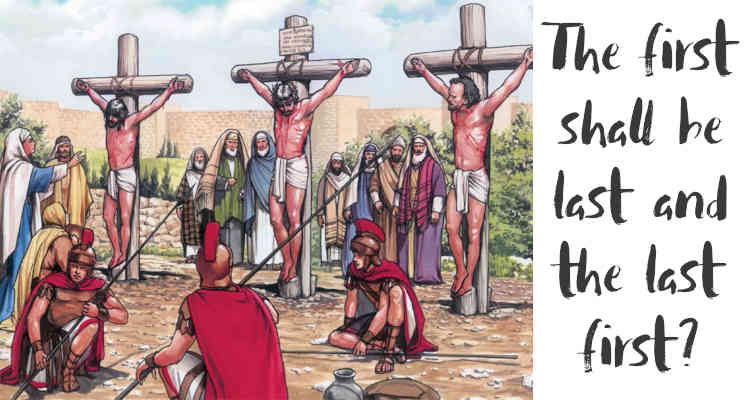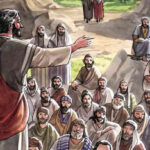Almost everyone reading this knows “Jesus died for our sins”, even if they don’t believe it. But who did Jesus die for?
Do the poor, the outcast and the forgotten get any special treatment?
Jesus and the “least of these”
Jesus, like God in the Old Testament (not surprisingly), seems to have a special affection for the poor and downtrodden. He argues with the religious establishment – in Matthew 23 he calls them “hypocrites”, “blind guides” and “snakes”. He speaks sternly to a rich man (Mark 10:17-27) and to Nicodemus, a member of the ruling Sanhedrin no less (John 3).
Yet he speaks compassionately to poor and despised people, such as an ostracised woman with a bad reputation (Luke 7:36-50), a poor widow (Luke 21:1-3), the despised tax collectors Levi (Mark 2:14-15) and Zacchaeus (Luke 19:1-10), a sick woman (Luke 8:43-48), a crippled woman (Luke 13:10-17) and the crowds that followed him (Matthew 9:36).
Shocking teachings
The religious leaders of his day found these teachings and actions somewhat shocking. We are comfortable with them, of course, for even those who don’t believe in Jesus generally think he was someone we can admire for his love for all people.
But Jesus had other teachings about the poor that are shocking to many modern day christians.
- He said in the next world the pecking order of society would be inverted. Those who are first now will be last then (Matthew 20:16). It is true that Mark and Luke soften this a little to say “many of the first will be last”, but it is still a warning to those of us in first world countries.
- Luke also tells the parable of the rich man who dies and ends up in torment while the poor man Lazarus who begged at his gate ends up in paradise (Luke 19:31). When the rich man seeks pity from Abraham, the patriarch is blunt: “in your lifetime you received your good things, while Lazarus received bad things, but now he is comforted here and you are in agony.” Definitely a reversal of the pecking order!
- In another parable (Luke 18:9-17), Jesus says the humble will be lifted up and justified by God while the proud will not.
- Finally, in a famous parable of the last judgment (Matthew 25:31-46) it isn’t the “least of these” who will receive God’s approval in the age to come, but those who care for them.
Why are these teachings shocking?
These teachings should cause us modern christians to think again, for they seem on the surface to contradict Paul’s teachings (e.g. Ephesians 2:8-10) that what we do or who we are doesn’t win us God’s forgiveness and salvation, but God’s grace working through our faith. Jesus seems to be saying that God’s grace can be received via our actions and our need.
Of course it is possible to allow Paul to over-ride or re-interpret the clear meaning of Jesus’ teachings, but I can’t bring myself to think that is right. We must try to bring the two together somehow.
So what if Jesus really meant it, that the poor and the downtrodden were truly the recipients of his and his father’s special love?
And if God gave Jesus to the world because he loved us so much (John 3:16), does this mean Jesus died for the poor and the least who are recipients of God’s special favour?
“Selah” = pause and think calmly about this
I was thinking about these questions today as I listened again to Andrew Peterson’s amazing and moving song A White Man’s Lament for the Death of God’s Beloved. Written in response to racial killing in the US, the song includes these lines:
Then on the Resurrection morn
You’ll see the form of Jesus blazing in the sky
And then you’ll know how much he loved the ones who suffered
Whose blood was crying from the ground
And then you’ll reckon with the truth
That even they and even you
Were so much dearer than you knew
And I believe that there’s a reckoning in store
And all the poor and the oppressed
Will be the first who were the last
And all the lost and all the cursed will be the blessed
So let this kingdom of the least
Spread the table for the feast
And light the flame
Let us send the invitation
Every tribe and every nation
There’s no corner of creation
That is safe from this salvation
George, Breonna, Ahmaud
All beloved of God
This Easter …..
This Easter, let’s reflect on, and give thanks for, the extravagant love of God that has lifted us out of darkness into light. And maybe has reached out to more of his beloved than we can imagine.
The Calvinists say God only saves the elect. Most christians say God only saves those who explicitly put their trust in Jesus. The universalists say God’s love eventually saves everyone.
The Bible does hint at universalism, but I don’t think it teaches it (though I wish it were true). But maybe, as Jesus suggests (e.g. Mark 9:38-41, John 10:16), we will receive a pleasant surprise in the age to come.
Who knows how far God’s love for his beloved will extend?
Listen and weep
Related Posts
Graphic: Free Bible Images.



